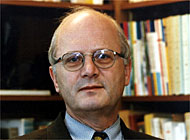Swiss dealers profited from flight of art during war

Swiss dealers and collectors snapped up works of art at knock down prices during the Second World War, according to a study.
The study was released this year by the Independent Commission of Experts (ICE), which was set up in 1996 to probe Switzerland’s wartime past.
The authors found that not only did Swiss dealers acquire art cheaply from Jews and other victims of the Nazis who were desperate to sell, they failed to come clean about their activities after the war.
The study by historian Georg Kreis and two co-authors examines both looted assets and what the authors call “flight assets” – works of art which were sent to Switzerland by Jewish owners or their agents in order to protect them from confiscation by the Nazis.
In an interview with swissinfo, Kreis said his study had found that quantity of “flight” art was far greater than that looted by the Nazis, and that the Swiss art market expanded substantially in the immediate pre-war years and throughout the war.
“German art dealers passed through the country and brought with them works of art, as well as contacts back in Germany”, said Kreis, who is the only member of the ICE to have directly co-authored one of the commission’s 25 case studies.
Dealers profited
As a result, Swiss art dealers and collectors, as well as public museums, benefited from tumbling prices, Kreis said. “But we shouldn’t conclude that, as a rule, they exploited the hardship of the original owners, many of whom were happy they could sell.
“But there are instances where buyers tried to push down prices even further, and it is in those transactions that the moral question arises.”
Contrary to other issues at the time, which only became controversial after the war, art dealers were aware of the dubious origin of many works that flooded markets outside Germany.
Swiss public museums and collections were more scrupulous than private collectors in their attempts to avoid buying looted art, the study has established.
Market for cultural assets
The real scandal in the Swiss market for cultural assets occurred not during, but after the war, Kreis contended. “There was no willingness to see what had gone wrong.”
Under Allied pressure, the Swiss government put in place special legislation for the restitution of works of art that had found their way into Switzerland. But the measures were severely flawed in the judgment of the authors.
The deadline for claims was set at two years – “too short for those robbed who had other problems on their minds in 1946 and 1947”, Kreis said, adding that they had no possibility to lodge their claims.
The Swiss authorities also acted only on the findings of British and US investigators instead of conducting their own investigations.
Crucially, restitution was restricted to assets confiscated during the war and to countries that had fallen under German occupation. “This meant that assets that were confiscated in Germany in the 1930s, and sold at so-called ‘Judenauktionen’ [auctions of Jewish possessions] weren’t covered at all.”
Rightful owners
The study also concluded that Switzerland’s restitution chambers were too lenient towards Swiss owners of assets that were returned to their rightful owners.
“Too often the owners were deemed to have acted in good faith, where from today’s vantage point we’d have to conclude they acted in pretty bad faith,” Kreis told swissinfo.
Swiss owners were then compensated by the Swiss government, which was in turn reimbursed by the Federal Republic of Germany for the costs incurred in the restitution process.
Kreis said it was a very “Swiss” way of dealing with the problem: “All the blame could be shifted to the party that was primarily responsible – Germany – while at the same time the fact that [Swiss people] participated in the injustice, too, could be covered up.”
by Markus Haefliger

In compliance with the JTI standards
More: SWI swissinfo.ch certified by the Journalism Trust Initiative
You can find an overview of ongoing debates with our journalists here . Please join us!
If you want to start a conversation about a topic raised in this article or want to report factual errors, email us at english@swissinfo.ch.